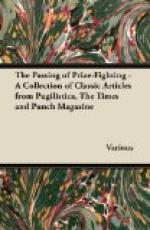Two days ago the MINISTER OF TRANSPORT expounded in a White Paper his elaborate plan for redistributing and co-ordinating the activities of the railway companies—the North Eastern excepted—and directing them all from an office in Whitehall. By the Ministry of Mines Bill it is proposed to treat the mines in much the same way. Sir ERIC GEDDES’ scheme has yet to run the gauntlet of Parliamentary criticism. Sir ROBERT HORNE’S had its baptism of fire this afternoon, and a pretty hot fire it was. Miners like Mr. BRACE cursed it because it did not go all the way to Nationalisation; coal-owners like Sir CLIFFORD CORY, because it went too far in that direction. The voice of the mere consumer, who only wants coal cheap and plentiful, was hardly heard. The second reading was carried, but by a majority substantially less than the normal.
Thursday, July 1st.—Unfortunately the House of Lords does not contain a representative of Sinn Fein and therefore had no opportunity of learning the opinion of the dominant party in Ireland regarding Lord MONTEAGLE’S Dominion of Ireland Bill. Other Irish opinion, as expressed by Lords DUNRAVEN and KILLANIN, was that it would probably cause the seething pot to boil over. Lord ASHBOURNE made sundry observations in Erse, one of which was understood to be that “Ireland could afford to wait.” The Peers generally agreed with him, and, after hearing from the LORD CHANCELLOR that of all the Irish proposals he had studied this contained the most elements of danger, threw out the Bill without a division.
“A sinecure, whose holder is in receipt of a salary of five thousand pounds per annum,” was Mr. BONAR LAW’S description of his office as Lord Privy Seal. The House rewarded the modesty of its hard-working Leader with laughter and cheers. None of his predecessors has excelled him in courtesy and assiduity; as regards audibility there is room for improvement. Mr. LAW rarely plays to the Gallery; but he might more often speak in its direction.
* * * * *
[Illustration: “THERE—THAT’S WHAT COMES O’ ARGUING ALONG O’ YOU; I’VE LAID FOUR BRICKS OVER ME THREE ’UNDRED!”]
* * * * *
“The funniest game in the world is chicket.”—Provincial Paper.
We should like to hear more of this humorous pastime.
* * * * *
A daily paper describes the contest at Henley for the “Silver Giblets.” It is rumoured that the Goose that laid the Golden Eggs has become a bimetallist.
* * * * *
THREE EXCEPTIONAL MEN.
“If these men are types, how London has changed!” I said to myself. But can they be? I fear not; I fear that “exceptional” is the only word to use. Yet it was very remarkable to meet them all on the same day, Friday, June 25th.




